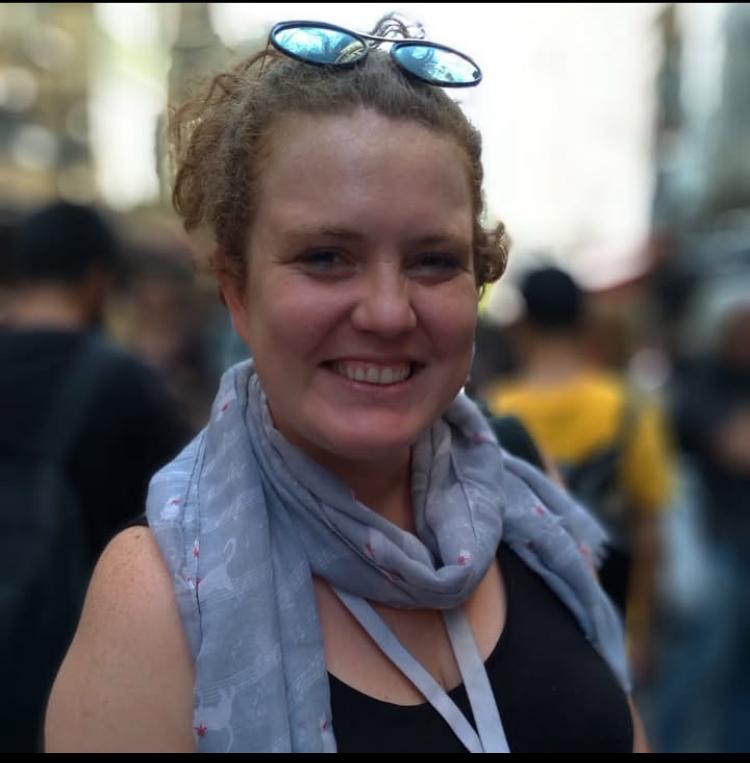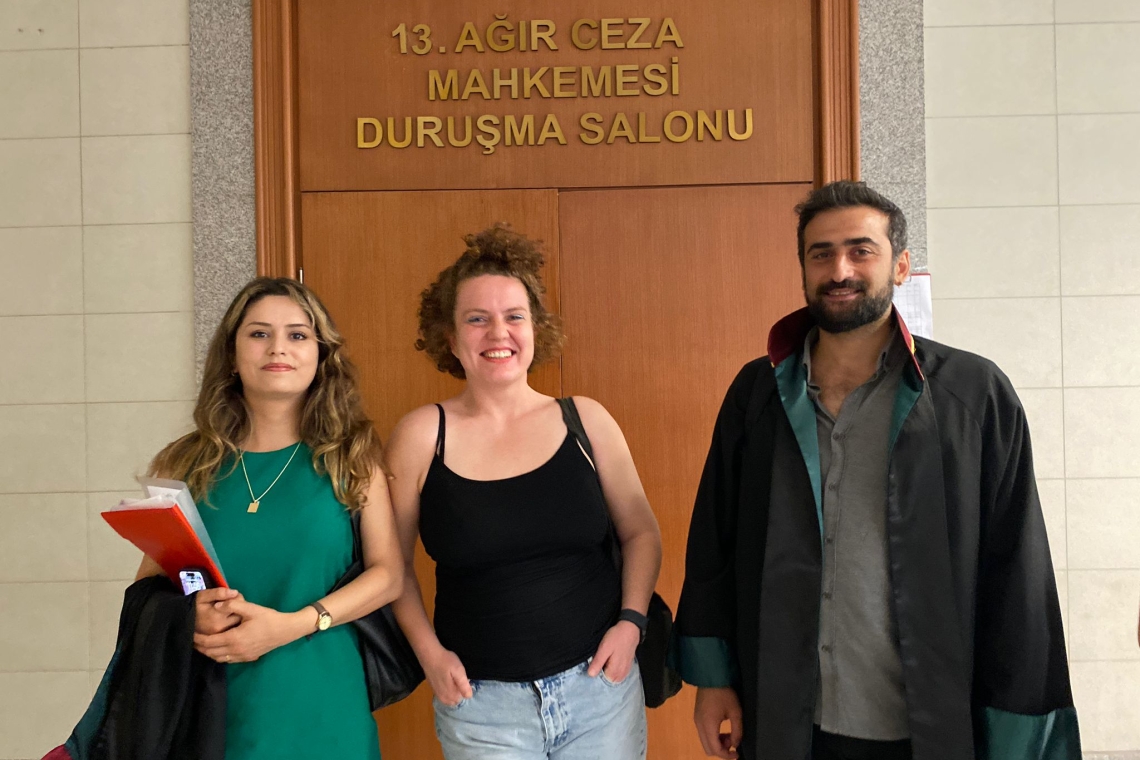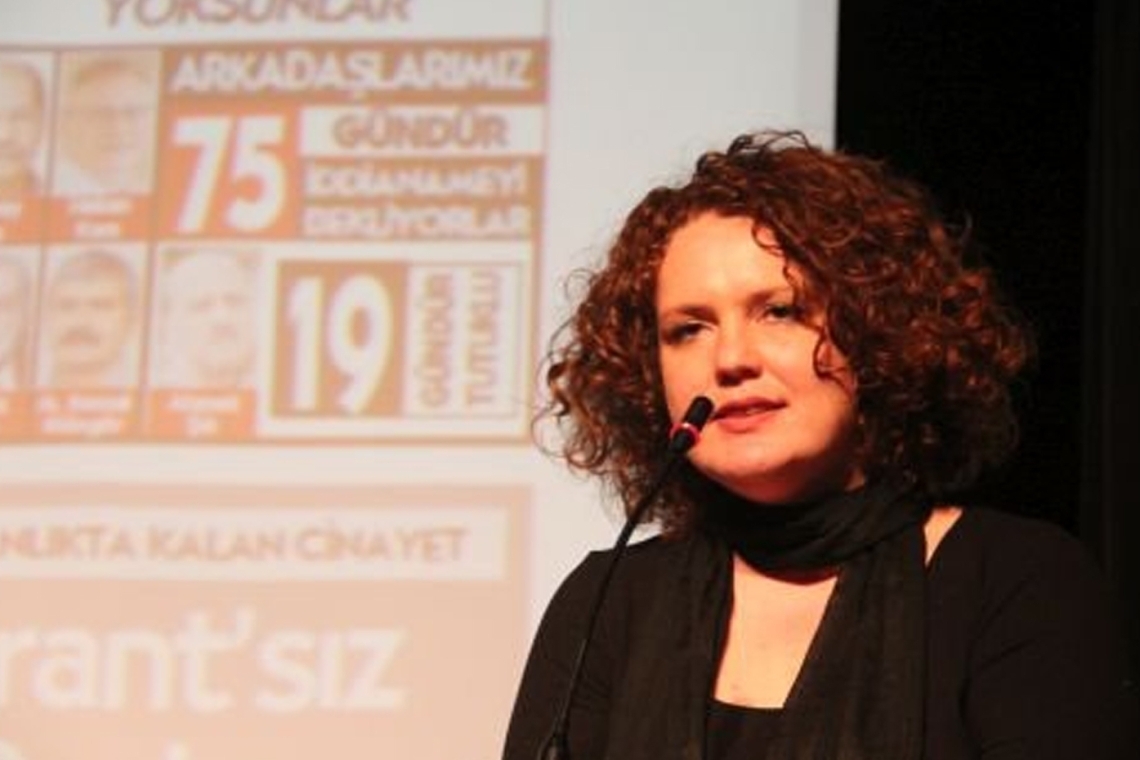Canan Coşkun
Journalist Elif Akgül, who has been in pretrial detention since February 22, has described her imprisonment as punishment not just for her journalism, but for her actions as a citizen advocating for press freedom. In an interview conducted from Bakırköy Women’s Closed Prison, Akgül said, “Not just me, all of us are imprisoned because we fulfilled our civic responsibilities.”
Although the judge cited “risk of flight” among the reasons for her detention, Akgül noted she has lived at the same address for years and spent more time covering court hearings than at home. The charges stem from a wider operation targeting the Peoples’ Democratic Congress (HDK), a civil platform once aligned with Turkey’s broader Kurdish movement. Akgül had participated in a few HDK meetings years ago in her capacity as a feminist journalist.
Akgül, who previously worked as the freedom of expression editor at the independent news outlet bianet, has covered hundreds of court cases against journalists over the years. Her reporting has included high-profile trials like that of murdered Armenian-Turkish journalist Hrant Dink, as well as lesser-known cases with no audience or media attention. “Since I began working as a journalist, my political activity as a citizen has been to amplify the voices of imprisoned colleagues,” she said.
Her current case includes wiretaps of journalistic interviews she conducted while at bianet. These recordings, along with her attendance at legal public meetings, are being used as evidence. The surveillance was carried out under orders issued by judges later dismissed from the judiciary for membership in the Gülen movement, which Turkey classifies as a terrorist organization. Akgül remarked that it was these judges and police officers, not her, who should now be defending their actions.
"Handcuffed for the cameras"
Recalling her arrest on the morning of February 18, Akgül described how anti-terror police raided her home at 6:04 a.m., banging on the door so loudly that she initially thought neighbors were reacting to a fire. “Seeing a masked officer with a long-barreled weapon wasn’t intimidating—more confusing,” she said. During the home search, she was allowed to use her neighbor’s phone to notify her workplace, though under the condition she not mention she was in custody.
After the search, she was handcuffed from behind when leaving the apartment—“for the cameras,” she said. Though the handcuffs were soon removed, they were reapplied in the same fashion upon entering the police headquarters. During her detention, she witnessed other detainees subjected to degrading treatment, including one woman who endured a strip search and another whose child had a gun pointed at their head.
She was held in a cell with poor hygiene, no toilet paper, and fluorescent lighting that constantly flickered. “For four days, we lived on stale bread and water,” she recalled. Meals provided by the police-contracted food suppliers were often moldy or inedible, though officers were reportedly eating the same.
Akgül said her first meeting with a lawyer was allowed only after two days. She was sent to court on the Friday, around 3:30 p.m., and by 5 p.m. was transferred to prison. Upon entry, she and other detainees were asked to undress behind a screen and wear surgical gowns—something she later learned qualifies as a form of strip search under Turkish law. “It didn’t bother me at the time, but learning what it really was upset me even more,” she said.
After four days in police custody and two in observation at the prison, she was moved to a ward where she and others are trying to create a livable space. “Since then, we’ve been working to make a life between four walls,” she said.
"Journalists, architects, artists—we're the intellectual ward"
Akgül currently shares her ward with 19 other detainees from the same investigation and one from another operation. “It’s like an intellectual ward—there are journalists, architects, artists, teachers,” she said. Daily life includes early morning headcounts, exercise sessions, and shared meals. She takes bağlama lessons from singer Pınar Aydınlar and participates in weekly meetings and letter-writing days, which she described as their “connections to the outside world.”
“We even formed a women’s circle to help process the trauma,” she said. Despite limited resources—like a recent run on pens at the canteen—the group maintains a sense of solidarity and purpose.
“I’ve always reported on jailed journalists. Now I am one.”
Akgül expressed irony over being imprisoned for the very actions she once reported on. “It’s strange to be ‘jailed journalist Elif Akgül’ now,” she said. “I probably published that phrase more than anyone.” One of the charges against her, she noted, is her public advocacy for jailed journalists—something she has done consistently throughout her career.
Reflecting on her arrest, she said, “When the detention order was read, I wasn’t surprised. I realized I was truly prepared for this treatment.” She criticized the daily “arrest list” aired on Turkey’s Halk TV as becoming so long it resembled a prayer scroll. “That list is the portrait of our collective detention,” she said.
Akgül emphasized that the criminalization of civic action is a growing trend in Turkey. “Humans are political animals, not social ones. You are a citizen only to the extent that you can speak in your society. My so-called ‘crimes’ are in fact my duties as a citizen,” she said. “We are imprisoned for doing what citizens are supposed to do.”
“I knew about the investigation for three years. I never fled.”
One of the justifications cited for Akgül’s detention is the claim that she might flee the country. Yet she said she has known since late 2022 or early 2023 that she was under investigation and never left her home address, let alone Turkey. In fact, she had returned from Italy just two days before her arrest.
She said she had been informed that her case was tied to a massive investigation launched in 2014 under FETÖ/PDY (the acronym for the Gülenist organization), and that the file included over 100 folders and was subject to a confidentiality order. Despite this, she continued to work as a journalist, regularly attending court hearings. “I’ve done nothing in this case I can’t defend. There’s not a single action, statement, or article—whether I knew about it or not—that I cannot stand behind,” she said.
Background
Photo: June 27, 2024 — Elif in front of the courtroom with her lawyers after being acquitted in the propaganda case.
Elif Akgül was arrested as part of an investigation targeting individuals linked to the Peoples’ Democratic Congress (HDK). During police questioning, she was asked about her attendance at legal meetings and her journalism. She stated that as a feminist journalist, she had attended two HDK meetings. She also pointed out that some of the phone recordings used as evidence were obtained under warrants issued by judges later convicted of membership in the Gülenist movement.
The 8th Criminal Judgeship of Peace in Istanbul ordered her arrest on grounds of “concrete evidence suggesting strong suspicion of a crime” and “risk of flight.” A subsequent appeal was rejected last week by the Istanbul 25th Criminal Court of First Instance.
In a separate case, Akgül was acquitted of “terrorist propaganda” charges over tweets and retweets from 2018 and 2022. That acquittal was upheld on February 6 by the appellate court.



